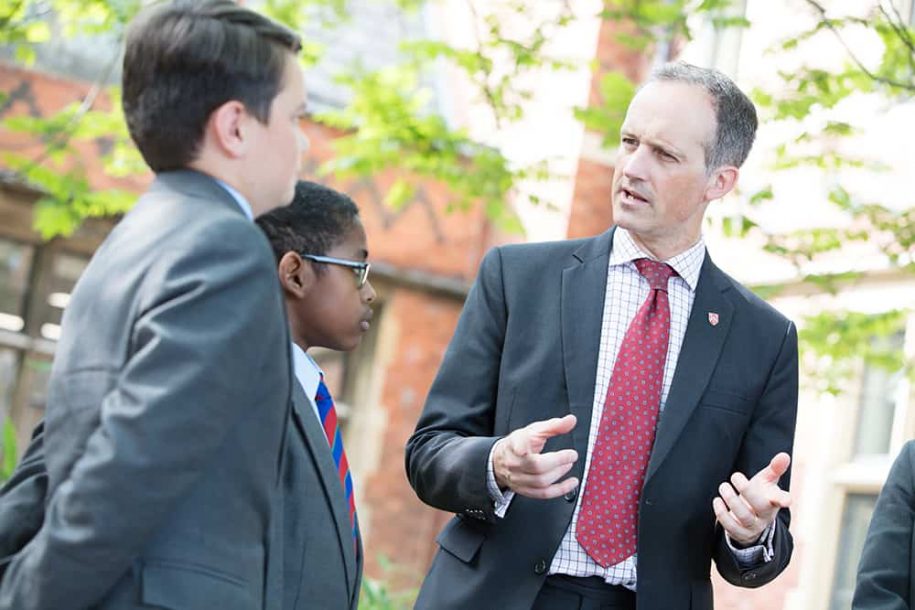Banter and Bullying

A topic that we return to on a regular basis with boys is the issue of ‘banter’ and how dangerous it can be. The original definition of banter is “the playful and friendly exchange of teasing remarks”. That males in particular find this amusing is nothing new, and in some respects ‘taking the mickey’ out of one another might be considered quintessentially British. It has often been pointed out that our ironic, non-literal use of English is the prime reason why, as George Bernard Shaw put it, the United Kingdom and the USA are two nations ‘divided by a common language’. Stereotypically, the British do not like to say what they mean. Extreme politeness – “I find your proposal really fascinating” – can mask contempt, yet an observer witnessing best friends indulging in personal ‘banter’ might conclude that they absolutely loathe one another.
In recent years, ‘banter’ has taken on a broader meaning among university students and other younger people, referring to practical jokes and even antisocial behaviour, particularly involving the excessive use of alcohol. As such, the concept no longer merely refers to light-hearted teasing among friends but can also include unpleasant behaviours that we might describe in a school as ‘bullying’.
We know, as teachers of boys, that we are not going to stop boys wanting to take the mickey out of one another. What we need them to understand is that banter is only banter if both people find it funny and that “it was just banter” is not an acceptable excuse for bullying. With any form of bullying, boys are always told to speak up and to inform an adult if they are being bullied. Of course, this is good advice. However, I believe that most of the boys who go too far with their banter would be mortified to be accused of bullying. We need to remind them that everyone has a different tolerance to banter, and that their antennae must be alert to signs of discomfort in their friends and classmates. In a recent assembly, I advised boys that the appropriate response to banter that has gone too far is to say “that’s enough; I don’t find that funny”, and that everyone must respect this boundary. To continue with banter once you know that your victim is uncomfortable is to move into the realm of bullying.
My assembly also covered three topics on which banter is always likely to be inappropriate: racism, sexism and homophobia. I am particularly concerned that young people can get themselves into serious trouble in the real world and that jokes about such topics are extremely dangerous. If they get into the habit of using risqué humour on the basis of race or sex, they may well embarrass themselves outside the confines of their safe friendship group. Making racist, sexist or homophobic remarks as an adult, even in alleged ‘jest’ can get you sacked or potentially in trouble with the law.
I addressed the school on the difficult subject of homophobic bullying. This is difficult because boys’ schools can sometimes have strong overtones of homophobic sentiment. Although my short time at LGS does not particularly suggest that this is the case here, I know from experience that any given Sixth Form contains a small but significant number of boys who will eventually ‘come out’, even though they usually find it impossible to do so while at school. Young people across the country use ‘gay’ casually as an insult: “that’s so gay” means “that’s so bad”. I worry how this must make pupils who think they may be homosexual feel. The purpose of my assembly was not to consider the debates that religions sometimes have about homosexuality. My focus was simply that we have to accept that homosexuality exists and that the use of homophobic language is as unacceptable as racist or sexist language. We must break the semantic link between homophobic language and negativity, as it can become an unbearable burden on boys in our community and help to entrench opinions that the younger boys have not even had time to think about carefully. My advice to boys was a quote using by the equality charity Stonewall in its publicity literature: “Some people are gay, get over it”.
I have asked my staff to challenge not just this sort of casual homophobic language in school, but also sexist language. Our boys must grow up to respect women, and I know that boys’ interaction with pupils from the High School, notably as they get older, leads them to be wary of sexual inequality. However, it’s too easy to let mildly sexist language pass unchallenged, for instance the automatic stereotypical assumption that a boy will be stronger, or that a girl will be more emotional about something that has gone wrong. I wonder if you saw the recent national ‘run like a girl’ campaign? Research had shown that negative language like this led to adolescent girls who had loved to be active in their early years falling out of love with sport and losing self-confidence more generally. As a keen distance runner, I’d actually quite like to run like Laura Muir or Paula Radcliffe (I’m proud of having run in the same London Marathon in 2003 when Radcliffe set the world record – even though, for some reason, I didn’t actually see her!). I’d like to ask you to challenge such sexist language so that our boys can avoid sweeping generalisations and judge women as individuals.
The LGS staff know that working on boys’ understanding of the risks of ‘banter’ will be a long-term project. We don’t want to stifle their sense of fun and their desire for a joke. We don’t want to ban banter, rather to make boys question how the recipient is responding, because, to rephrase the famous saying that you were told as a child by your parents, “sticks and stones may break your bones but words will gradually drag you down.”
